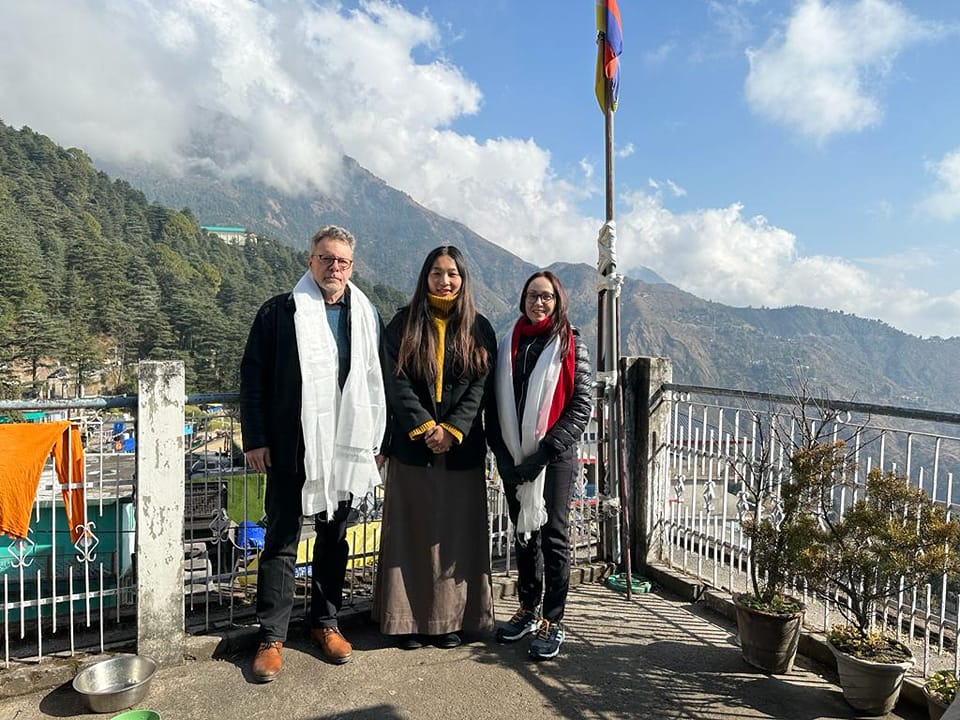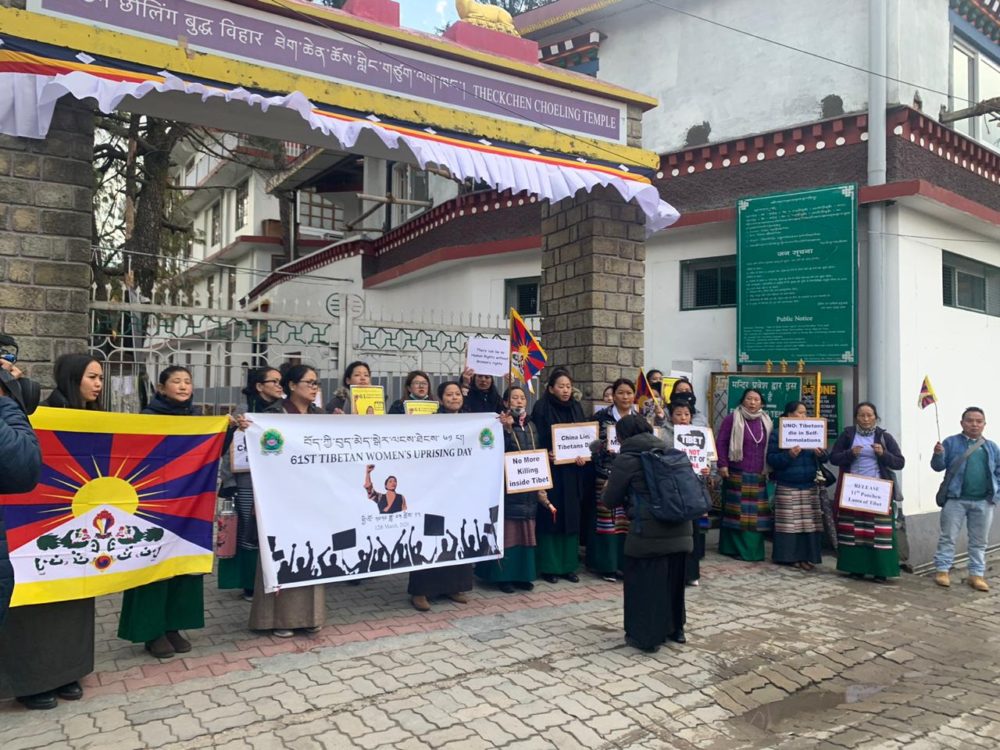TWA’s Tibetan Women’s Advanced Leadership Training 2010, report
Tibetan Women’s Advanced Leadership Training (TWALT); Advancing high level women leadership and promoting women representation in the Tibetan community
7th – 17th June 2010: House of Peace and Dialogue, Upper TCV School.
 The Tibetan Women’s Advanced Leadership Training organized by the Tibetan Women’s Association (TWA) kick started with a opening ceremony held at the House of Peace and Dialogue, Upper TCV School and was attended by dignitaries from the exile Tibetan Community.
The Tibetan Women’s Advanced Leadership Training organized by the Tibetan Women’s Association (TWA) kick started with a opening ceremony held at the House of Peace and Dialogue, Upper TCV School and was attended by dignitaries from the exile Tibetan Community.
Statistics say the Central Tibetan Administration is comprised of a 46% female and 54% male workforce, but this does not demonstrate the true situation. There is a shocking discrepancy of a low 3% of women at top level positions, in stark contrast to the 97% of males at high level positions. The same picture also fits in many other frames of Tibetan exile Diaspora.
The Tibetan Women’s Advanced Leadership Training (June 7 to June 17), an undertaking of the Tibetan Women’s Association, seeks to not only address this issue, but to tackle it by enabling women’s representation in the higher realms of representation and ranks of governance. Thirty professional and high potential Tibetan women leaders from all over India participated in this 11-day training, which is the first of its kind. Additionally, this training accentuated the implementation of the Kashag’s eight point policy on women’s empowerment launched in October 2010. It also provided a niche platform and a creative forum for potential women leaders to identity and hone their leadership skills.
The Chief guest for the afternoon’s ceremony, Mrs. Rinchen Khando, former minister of the Tibetan Government in exile and the founding president of the TWA applauded this daring initiative of TWA and said that “women, rather than waiting for equal opportunity to befall them, should prove their mettle and if anyone dares to interrupt, then the women should assert their equal rights.” Mrs. Gyari Dolma, the deputy speaker of the Tibetan Parliament in exile, said that “compared to the other societies, Tibetan women have had equal footing and they are well positioned, but it is also increasingly important to identity and address the gaps and the loopholes and then empower women who constitute a very important proportion of the Tibetan community.” Mr. Tsewang Yeshi, the President of Tibetan Children’s Village Schools, lamented that “intentionally or unintentionally, there is discrimination against the Tibetan women and hence it is essential to sensitize and educate the larger community and take collective efforts to empower women for the benefit of the society.”
The guests also launched the 21st anniversary special edition of ‘DOLMA’ magazine, TWA’s annual literary magazine in both Tibetan and English, which stands for the intellectual expression of and for Tibetan women.
The 11-day training was divided into three phases; professional and experienced resource speakers from the exile Tibetan Community officiated the first phase of the training on ‘Understanding Leadership’. Lynda O Lepcha, the director and master trainer of Holistic Training Solutions (New Delhi) lead the second phase of the training on ‘Building Leadership Skills’. TWA trainer Dhardon Sharling along with Michelle Pomeroy, a young trainer from the United States who has served as a training coordinator, spearheaded the final phase of the training on ‘Practicing Leadership’. Gaea Logan, professional psychotherapist, a professor and author based in the United States actuated the evening sessions on ‘Women and Personal Dialogue.’
An insight into the 11-day training;
Day 1 – June; Orientation, Motivation and Goal Setting
An introduction and orientation round followed the opening function. Dr. Kunchok Tsundue, Secretary of the Planning Commission, CTA spoke to the participants about the general overview of Women’s Representation in the CTA and the significance and relevance of this training.
Michelle Pomeroy led the first session on motivation and goal setting. Many of the participants could relate well to these concepts as we tend to have many goals in our lives but fail to work towards achieving them.
Gaea Logan, professional led the evening session on “Aspiration, Intention and Vow: the process of leadership development.” The exercises inspired us to utilize others’ strengths as sources of aspiration.
Trainee feedback: “It pushed me to set my goals not only the long term goals, but small goals I could achieve in a month’s time. I had been procrastinating for a long time, will try to avoid it.”
Day 2 – June 8; Experienced Women Panel Discussion, Media and Advocacy Training
Two powerful panel discussions were held. The first panel comprised of Mrs. Tashi Dolma, Department of Education, CTA, Mrs. Tsering Yangkey, Director of TESI Team and Kirti Dolkar Lhamo la, Member of TPIE and President of TWA. The second panel discussion encompassed four female Settlement Officers; Tsering Lhamo (Bir), Karma Dolma (Poanta Sahib), Tenzin Kunsang (Shimla) and Yeshi Choedon (Sataun). It was encouraging to know how these women struggled through their lives to overcome challenges and attain great success.
Tenzin Tsundue, an activist and writer, led the second session on Media and Advocacy that stressed on the significance of media as the 4th pillar in a democratic set up. The day ended with Gaea Logan’s session on “Aspiration: Be the change.”
Trainee feedback: “Very effective, needs more of these for Tibetan youths to get empowered; we need more time on this session.”
Day 3- June 9 Women’s Empowerment and Conflict Resolution
The days’ session on “Women’s Empowerment” lead by Tenzin Tseyang, Coordinator of WED, drew everyone’s attention to the ‘culture of silence’ that is prominent among Tibetan women. It was educative and identifiable when Tseyang shared anecdotes relating to her experiences in training grass root people at the Tibetan settlements.
The afternoon session was led by Mr. Karma Lekshey (Director) and Miss. Tencho Choemphel (Information Officer) of the Tibetan Centre for Conflict Resolution. The training taught presented many new approaches to conflict which were very practical and applicable.
The evening session by Gaea Logan on “Intention: Dancing with Mara” had the participants enact the roles of aspirations, support systems and ‘Mara’(negative thoughts in a person) was enjoyable and from this exercise we learned that as much strengths as we have, we also have weaknesses in us and therefore, it is important to focus on personal strengths in working towards your goals.
Trainee feedback: “Absolutely enriching experience learned a lot of new ideas to empower the society at large. Inspiring to see a young trainer trying to educate on such an important issue.”
Day 4- June 10 Effective Communication Skills and Time Management
The morning session on communication skills led by Dhardon Sharling was very clear and precise with plenty of exercises and activities. The session was very effective and it was elating to see active participation from all. Good communication skills are the basic requisite of a good leader, and this session helped us realize the need to learn and grow as better communicators.
Michelle Pomeroy led the afternoon session on time management and personal effectiveness. The techniques on time management were simple and easy to implement, such as the ‘SMART’ goals and the need for a ‘time log’ to track one’s efforts and time spent working towards your goals. The day concluded with the participants attending to the invitation to take part in an on-air discussion at the radio station ‘Voice of Tibet’ on the topic; ‘Women’s Empowerment’.
Trainee feedback: “The skill is must for a leader. Very informative, could relate so well with the activities, and a complete new exposure especially the exercise on press conference, loved it.”
Day 5- June 11 Males speak; Where and Why Women go Wrong
On this day, five male Secretaries from Central Tibetan Administration shared their experiences with our participants and also brought in a male perspective to women leadership and focused their discussion on the positive and negative attributes of women in their work sphere. The purpose of the session was to hear from males of high-level positions the major hindrances in women advancing their career. The discussion ended constructively as the Secretaries gave constructive suggestions to tackle these challenges.
The participants then reflected on the crux of the message from the morning’s discussions, and worked in groups to brainstorm and devise remedies to the problems, flaws and loopholes expounded by the Secretaries. The groups prepared a power point presentation on the proposed solutions to meeting the challenges.
The networking dinner was the highlight of the day and gave participants the opportunity to dine and have conversation with the male Secretaries and strengthen the networking circle.
Trainee feedback: “Thank you TWA for inviting the male Secretaries and listening to their experiences changed my viewpoint towards them. Networking dinner was a great idea.”
Day 6- June 12; Transactional and Transformational leaders
This day commenced the second phase;’ Building Leadership Skills’ led by Lynda O Lepcha. Lynda demonstrated effective communication with the use of an inspirational story to get one’s message across in a simple and direct manner. The morning session examined the differences between transactional and transformational leaders.
It was interesting to see the participants involved as Lynda began with the concept of ‘DISC Profile’. The DISC report measures four dimensions of normal behavior: 1) Dominance: how you respond to problems and challenges 2) Influence: How you influence others to your point of view 3) Steadiness: how you respond to the pace of the environment 4) Compliance: How you respond to rules and procedures set by others. The participants related the concept. The focus then shifted to ‘Leadership Challenge’.
In the evening, Ven. Ngawang Woebar, President of Gu Chu Sum Movement for Tibet presented on the topic ‘Political Prisoners in Tibet.
Trainee feedback: “Enjoyed the session thoroughly, learned lots of new games which I shall share with my colleagues. Her presentations and video clips were so great.”
Day 7- June 13; Strengthening Beliefs and Values of a Leader
The day’s theme was ‘The Five Practices’. In leadership it is sometimes important to challenge the process by experimenting, taking risks and asking ourselves what we can learn when things do not work as planned. It was important to learn that transactional trust is reciprocal and it is created incrementally, step by step.
The session on ‘Beliefs and Values’ were effective as the participants were given value cards and asked to rank their personal values on a sheet of paper and then were made to agree on the three highest and lowest values in a group. The most interesting thing of the day was when Lynda brought in the concept of ‘Feed Forward’ instead of feedback. The objective of the activity was based on the importance of encouraging the heart.
Lynda then spoke about the importance of ‘Visualization’ and related activities helped illustrate changes and commitments that participants need to build on. The day ended with a whole lot of commitments.
Trainee feedback: “I learned how different people can be but there are different ways in dealing with persons of differing natures. Got plenty of feed forward to empower myself.”
Day 8- June 14; Leadership Skills in Influencing Others
The day’s theme was “Influencing Others to Get Things Done.” It was informative to learn the different influencing styles including: logical persuasion, asserting, common vision, participation and trust. Each participant was given a handout to see how influential she is and in which of the four styles she fits into.
The ‘Thomas Kilmann Model’ in managing conflict was attractive. It became very clear that avoiding conflict is never the solution. The participants were then given ‘post it pads’ and asked to write down one thing they want to start, continue and stop doing as a leader. Then we examined the ‘Grip model,” which addresses team effectiveness. This exercise on making a balloon sofa tested whether the team had a common goal, trust, a shared vision and objective.
Gaea Logan completed her final evening session on “Vow: Visioning the Future, Redefining the Present.” The envisioning of a different future helped us to redefine our present actions, perceptions, attitudes and behaviors.
Trainee feedback: “It was fun, educative, motivating, challenging and effective.”
Day 9- June 15; Evaluating Communication and Team building skills
With this day we entered the third and final phase; ‘Practicing Leadership’. We had the group divided and assigned topics. This daylong exercise was to evaluate the leadership skills that the women gained over the past eight days. The participants were divided into 6 groups and each group represented 6 departments of the CTA namely; Home, Health, Education, Finance, DIIR and Culture and Religion. The groups expounded on practical implementation of Kashag’s Eight Point Policy on Women’s empowerment. The whole dialogue process was filmed for further evaluation.
Later in the afternoon, Victoria Camp led a session on Public Speaking that proved very effective. Following the long and intensive week-long training, the participants enjoyed a ‘walk in paradise’ up to Naddi hills to refresh, relax and unwind.
Trainee feedback: “It was very practical, feels great to see myself in the video and evaluate myself.”
Day 10- June 16; Project Proposal and Implementation
The six groups were made to draft a project proposal for Rs.1000/-to be implemented on the same day. Dr. Kunchok Tsundue la guided the groups through the process. Each group presented their project and Dr. Kunchok gave ‘feed forward’ after each presentation. Following lunch, all teams dispersed in and around Dharamsala to implement their projects. TWA’s co-trainers followed each team and filmed the groups implementing their projects. After dinner, everyone gathered to share their experiences and reflect on the successful implementation of their projects. The day long practical evaluation clearly proved that we are all capable and the day ended with a great sense of accomplishment.
Trainee feedback: “I am happy our team won the extra cash prize and could help one more home at TCV with first aid box.”
Day 11- June 17; Final Grand Evaluation at Upper TCV School
The same six groups nominated their best speakers who sit on the panel discussion that presented the action plan for the implementation of the Kashag’s Eight Point Policy to the senior school students of Tibetan Children’s Village. The discussion was effective and constructive. The inflow of questions from students was appreciated and it was nice to hear some of the male students speak about women’s empowerment. Mrs. Sonam Dolkar, the Education Director of Tibetan Children’s Village, addressed the gathering thanking TWA for the wonderful initiative of holding such trainings. All the participants and trainers shared their experiences during the final closure led by TWA’s program coordinator Nyima Lhamo and gave positive ‘feed forward’ for future TWA trainings. This was followed by a written feedback evaluation.
The closing ceremony had Mrs. Gyari Dolma, Deputy Speaker of the TPIE give away the certificates and in her deliberation lauded the efforts of TWA and stressed on the importance and need of such trainings and encouraged TWA to organize similar trainings at the grass root levels across Tibetan settlements.
Trainee feedback: “This training required a lot of time, commitment and challenges over the year, we are happy that this training ended on a positive note.”
Conclusion
TWA is confident that the heights of leadership skills that these women attained from this training will help them to climb ladders of success. TWA proudly looks at these women as ‘Empowered Women for an Empowered Nation.’ Both the trainers and trainees jointly agree that this training was a huge success and we remain thankful to The Shelley and Donald Rubin Foundation (USA) for supporting this maiden venture of TWA with the much needed financial impetus along with financial resources from the Open Meadows Foundation.
“By the end of this training, we aspire to see women who are not only empowered, but also capable, prepared and willing to take up challenging roles in the decision making arena,” said Kirti Dolkar Lhamo, the president of TWA.
TWA’s primary goal is to advocate the rights of the Tibetan women inside Tibet and to empower the women in exile. This training fits in the paradigm of TWA’s ‘leadership and empowerment actions’ that also includes the ‘Annual Young Tibetan Women’s Leadership Program,’ ‘All India Gender Sensitization Training’ and the ‘Annual Tibetan Nuns Leadership Training’.
Also view the photographs on Flickr.
[slickr-flickr set=”Advanced Leadership Training in the Tibetan community 2010″ items=”50″ type=”slideshow” align=”center”]



